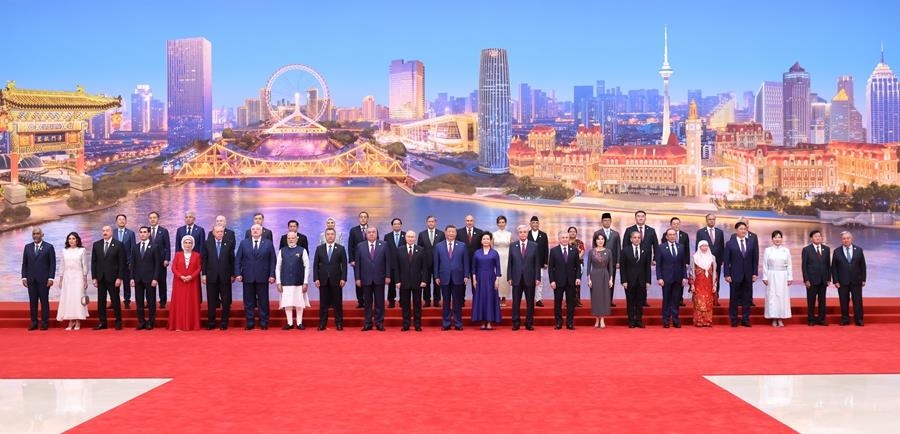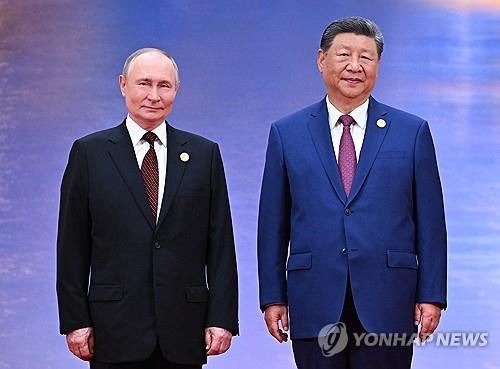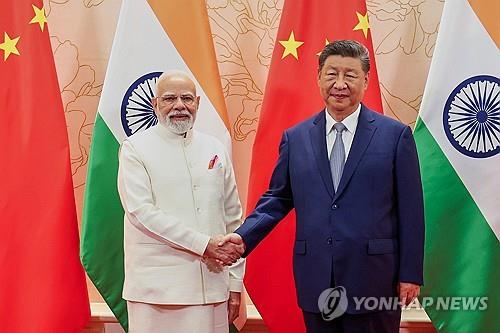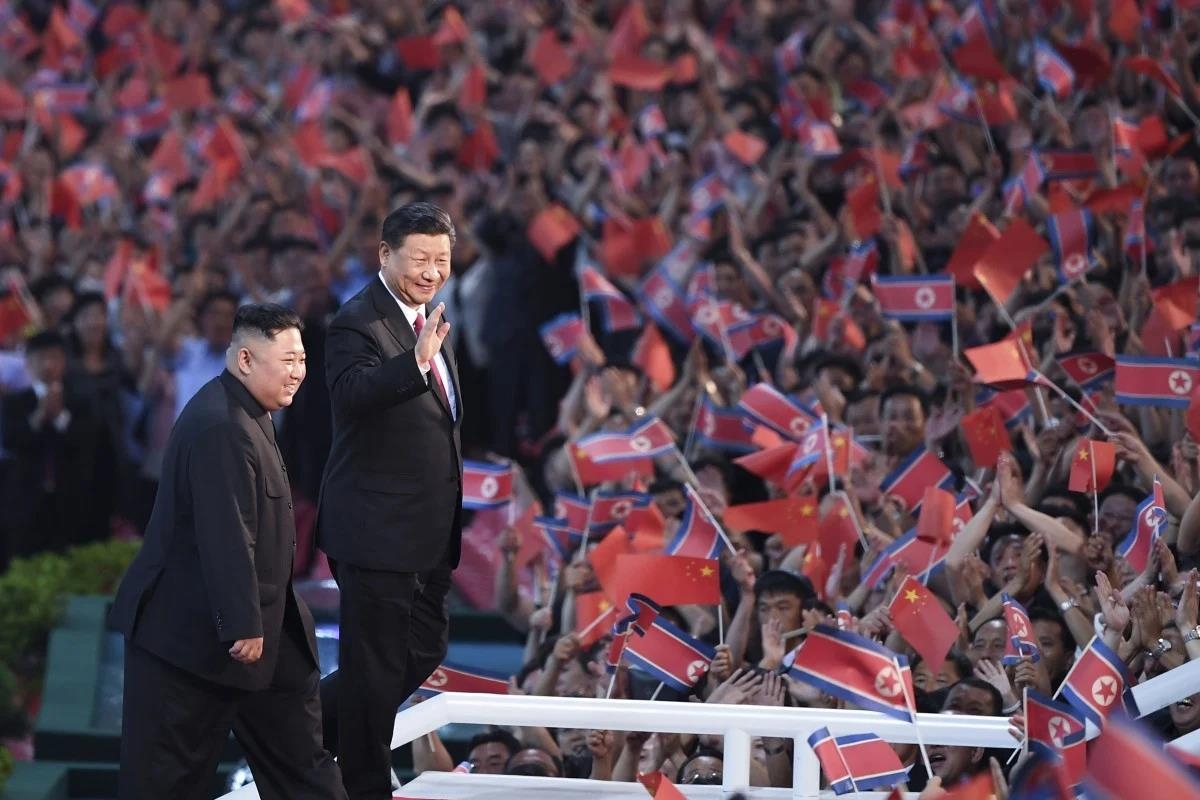
(Seoul = Yonhap News) Reporter In Kyo-jun = As the Shanghai Cooperation Organization (SCO) Tianjin Summit enters its second day on the 1st, attention is being paid to whether the China-led 'anti-American, anti-American big tent' will become a reality.
The key issue is whether the resistance targeting"America First" will bear fruit amid the flow of events that include the SCO summit for two days starting on the 31st, the military parade commemorating the 80th anniversary of the victory of the Chinese People's War of Resistance Against Japanese Aggression and the World Anti-Fascist War (Victory Day) in Beijing on the 3rd, and the Eastern Economic Forum in Vladivostok, Russia from the 3rd to the 6th.
China claims that the series of trends emphasizes harmony and unity in the Global South (a general term for emerging and developing countries, mainly located in the Southern Hemisphere), but it is clear that the underlying intention is to challenge US hegemony.
With the"bromance" between China and Russia at its core, attention is focused on whether China will properly restore its relationship with North Korea, which is"close yet distant," and to what extent India will join in its resistance against the United States.
◇ A major event between China and Russia to challenge the US-led international order… Focus on rallying forces resisting the US
On the evening of the 31st, the first day of the SCO Tianjin Summit, President Xi Jinping and his wife Peng Liyuan held a welcoming dinner with the largest number of SCO leaders ever.
The official Xinhua News Agency reported that around 20 heads of state, including SCO member states and observer countries, and 10 heads of international organizations attended.
According to comprehensive reports, on the opening day of the SCO and the day before, President Xi Jinping held summit meetings with Indian Prime Minister Narendra Modi, Turkish President Recep Tayyip Erdogan, Maldivian President Mohamed Muizu, Armenian Prime Minister Nikol Pashinyan, Azerbaijani President Ilham Aliyev, Belarusian President Alexander Lukashenko, and Kyrgyz President Sadyr Japarov at the Tianjin State Guest House.
President Vladimir Putin held an informal conversation with President Xi before the welcoming dinner the previous day.
The biggest point of interest at the two-day SCO Tianjin Summit was the summit between President Xi and Indian Prime Minister Modi.
The three-day Victory Day parade is expected to be attended by the leaders of Vietnam, Laos, Indonesia, Malaysia, Mongolia, Pakistan, Nepal, Kazakhstan, Uzbekistan, Tajikistan, Kyrgyzstan, Turkmenistan, Belarus, and Iran. North Korean Chairman Kim Jong-un's presence is expected to draw attention. A historic gathering of the leaders of North Korea, China, and Russia is also anticipated.

Separately, the international community is also paying close attention to whether a trilateral summit between North Korea, China, and Russia will be held.
After concluding a four-day visit to China, President Putin will attend the Eastern Economic Forum on the 5th, where he will meet with representatives from approximately 80 countries. This is a move to expand his influence, building on the momentum of his summit with US President Trump on the 15th of last month.
The general analysis is that the core issue connecting these three major events is the debate over how to respond to President Trump's America First policy.
In this context, President Xi Jinping's emphasis at the SCO Tianjin Summit the previous day that"the SCO will unite the power of the Global South to make greater contributions to the development of human civilization" and President Putin's emphasis in an interview with Xinhua News Agency on the 30th that "we will solidify solidarity across the Eurasian space" can also be understood.
◇ The SCO's most interesting figure is Modi... How far will India and China narrow the gap?
Even before the SCO Tianjin Summit, diplomatic circles were on edge about the movements of Indian Prime Minister Modi, who was visiting China for the first time in seven years.
It remains to be seen how India, which has been hit with a 50% reciprocal tariff by the Trump administration, will distance itself from the United States and approach China.
A key point to watch is India's change in position as it participates in the Quad, a security consultative body with the United States, Japan, and Australia, aimed at pressuring China.
Bloomberg News reported on the same day that"China and India are accelerating efforts to restore their relationship following the trade war with the Trump administration," and pointed out that despite the "enemies" between the two countries due to military, security, and diplomatic clashes, they are"desperately close" economically.
In fact, India not only relies on China for hardware, including rare earth magnets and intermediate components that are key components for everything from smartphones to electric vehicles, renewable energy, and home appliances, but also strongly hopes for investment from Chinese conglomerates such as Alibaba and Tencent.
China, too, is facing a significant blow to its exports due to the war in Ukraine and US tariffs and trade pressure, and there is a strong sense that it cannot afford to give up India, the world's largest market.
Some"friendly" measures have already been implemented through mutual visits between the foreign ministers of the two countries in July and August. At India's request, China's supply of rare earth elements has significantly resumed, and direct flights between China and India, previously suspended, have resumed this month.
In this context, Bloomberg reported that at the summit the previous day between President Xi and Prime Minister Modi,"they pledged closer cooperation to address the economic fallout from the U.S.-led trade war."

According to Xinhua News Agency, President Xi Jinping emphasized to Prime Minister Modi that bilateral relations should not be defined by border issues and that being friends is the right choice. Prime Minister Modi's specific comments on this matter were not reported.
Given that Pakistan, currently an adversary of India, is a member of the SCO, attention is focused on whether Prime Minister Modi will add his name to the SCO Tianjin Summit agreement. Prime Minister Modi is maintaining a restrained approach to China, refraining from attending the Victory Day parade on the third day.
Some speculate that Prime Minister Modi, who attended the SCO Tianjin summit to counter President Trump after being hit with a 50% tariff on Russian crude oil imports, will not significantly lean toward China. They suggest he will pursue"equidistant diplomacy."
◇ Kim Jong-un, 'examining' North Korea-China-Russia ties... Will he focus on China's economy and Russia's security?
The person who attracts the most attention at the Victory Day parade on the 3rd is undoubtedly Chairman Kim.
The parade will be attended by leaders of 26 countries, mainly from Central Asia and Africa, as the European Union (EU), the United States, Japan and other Western countries, which regard President Putin as a war criminal for the Ukrainian war, are reluctant to attend.
Attention is focused on whether Chairman Kim, who will stand on the Tiananmen Square with President Xi Jinping and President Putin to observe the military parade, will use this visit to improve the previously strained North Korea-China relationship.
Chairman Kim visited China for the fourth time from January 7 to 10, 2019, about a month before the second North Korea-US summit with President Trump in Hanoi, Vietnam (February 27-28, 2019). However, it was reported that he was considerably dissatisfied with President Xi and China's subsequent distancing measures.
Against this backdrop, Chairman Kim and President Putin signed the"Comprehensive Strategic Partnership Treaty" in Pyongyang on June 19th of last year, and based on this agreement, North Korean troops began being deployed to the Ukraine war. The number of troops deployed was in the tens of thousands, and in return, North Korea received economic support from Russia.

A noteworthy point is that the new treaty between North Korea and Russia stipulates that if either side is invaded and enters a state of war, both sides will provide military and other assistance without delay using all available means, in accordance with Article 51 of the UN Charter and the laws of North Korea and the Russian Federation.
Unlike the North Korea-China treaty's automatic military intervention clause, which is virtually a dead letter, China appears to be nervous about this close North Korea-Russia security approach.
Meanwhile, Hong Kong's South China Morning Post (SCMP) reported, citing experts, that Chairman Kim's visit to China could potentially revitalize relations between Beijing and Pyongyang and lead to a strategic realignment.
However, some observers say that Chairman Kim's attendance at the Victory Day parade is a sort of"test" of the international situation, given that US President Trump has shown a willingness to actively pursue the improvement of North Korea-US relations, a long-held wish of Chairman Kim.
“There is no alternative to China as North Korea’s economic partner,” Artyom Lukin, a professor at Russia’s Far Eastern Federal University, told the SCMP. “While Russia has emerged as North Korea’s political and military ally, China remains its economic beneficiary.”

